Work Planner Average Salary in Nigeria 2024
How much money does a person working as Work Planner make in Nigeria?

LOW
116,000
NGN AVERAGE
214,000
NGN HIGH
323,000
NGN
A person working as Work Planner in Nigeria typically earns around 214,000 NGN. Salaries range from 116,000 NGN (lowest) to 323,000 NGN (highest).
Salary Variance
This is the average salary including housing, transport, and other benefits. Work Planner salaries in Nigeria vary drastically based on experience, skills, gender, or location. Below you will find a detailed breakdown based on many different criteria.
Work Planner Pay Scale and Salaries in Nigeria
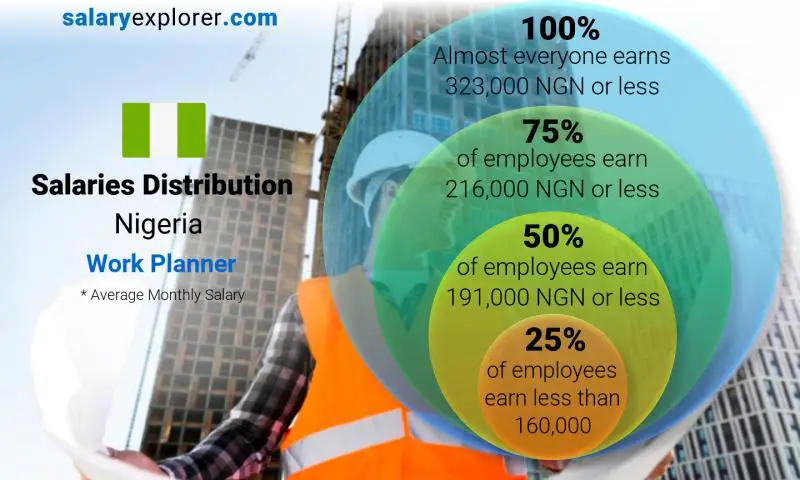
Salary Structure and Pay Scale Comparison
191,000 NGN or more
171,000 to 191,000 NGN
127,000 NGN or less
127,000 to 171,000 NGN
 116,000 NGN |
 191,000 NGN |
 323,000 NGN |
Median Salary, maximum and minimum salary, minimum wage, starting salary, and the salary range
Salary Range, Minimum Wage, and Starting Salary
Salaries for the position Work Planner in Nigeria range from 116,000 NGN (starting salary) to 323,000 NGN (maximum salary). It should be noted that the given figure is not the legally mandated minimum wage; rather, it represents the lowest figure reported in a salary survey that included thousands of participants and professionals from all regions of the country.
Median Salary
With a median salary of 191,000 NGN, half of the professionals who work as Work Planner in Nigeria earn less than this amount, and the other half earn more. The median salary denotes the middle value of salaries. Ideally, you would want to belong to the group earning more than the median salary, located on the right side of the salary distribution graph.
Percentiles and Salary Scale
The median is closely associated with two other values known as the 25th and 75th percentiles. By examining the salary distribution chart, it can be determined that 25% of professionals employed as Work Planner in Nigeria earn less than 160,000 NGN, while 75% earn more. Similarly, the chart shows that 75% earn less than 216,000 NGN while 25% earn more.
Pay Scale Structure
To provide a better understanding of expected salaries, we categorized the frequently occurring salaries into different ranges. This approach provides a more precise representation of salary distribution for the job title Work Planner in Nigeria compared to simply calculating the average. The majority of reported salaries, approximately 65%, fall within the range of 127,000 NGN to 171,000 NGN. About 20% of salaries are below the 127,000 NGN mark, while 10% fall within the range of 171,000 NGN to 191,000 NGN. Only 5% of individuals have salaries exceeding 191,000 NGN.
Salary Comparison by Years of Experience / Work Planner / Nigeria
How do experience and age affect pay?
| 0 - 2 Years | 134,000 NGN | |
| 2 - 5 Years | +26% | 170,000 NGN |
| 5 - 10 Years | +32% | 224,000 NGN |
| 10 - 15 Years | +18% | 263,000 NGN |
| 15 - 20 Years | +11% | 291,000 NGN |
| 20+ Years | +6% | 310,000 NGN |

The experience level is the most important factor in determining the salary. Naturally, the more years of experience the higher the wage. We broke down salaries by experience level for people working as Work Planner and this is what we found.
Employees with less than two years of experience earn approximately 134,000 NGN.
While someone with an experience level between two and five years is expected to earn 170,000 NGN, 26% more than someone with less than two year's experience.
Moving forward, an experience level between five and ten years lands a salary of 224,000 NGN, 32% more than someone with two to five years of experience.
Additionally, professionals whose expertise span anywhere between ten and fifteen years get a salary equivalent to 263,000 NGN, 18% more than someone with five to ten years of experience.
If the experience level is between fifteen and twenty years, then the expected wage is 291,000 NGN, 11% more than someone with ten to fifteen years of experience.
Lastly, employees with more than twenty years of professional experience get a salary of 310,000 NGN, 6% more than people with fifteen to twenty years of experience.
Typical Salary Progress for Most Careers
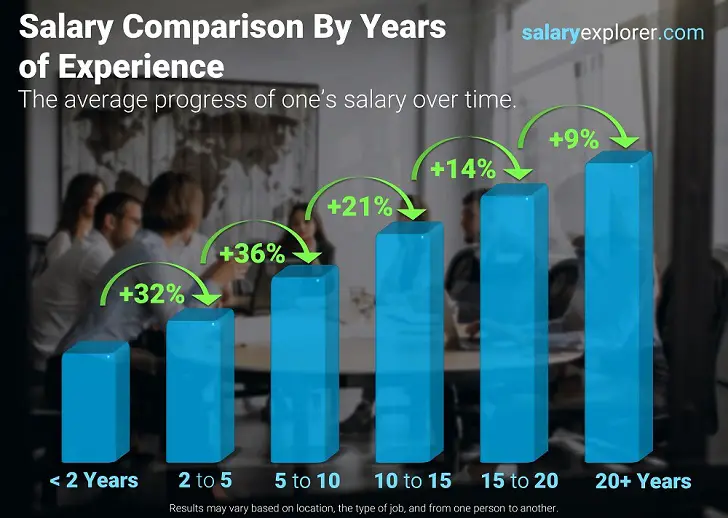
Salary Comparison By Education / Work Planner / Nigeria
How do education levels affect salaries?
Displayed below is the average salary variance between different education levels of professionals working as Work Planner.
| High School | 163,000 NGN | |
| Certificate or Diploma | +13% | 184,000 NGN |
| Bachelor's Degree | +32% | 242,000 NGN |
| Master's Degree | +24% | 301,000 NGN |
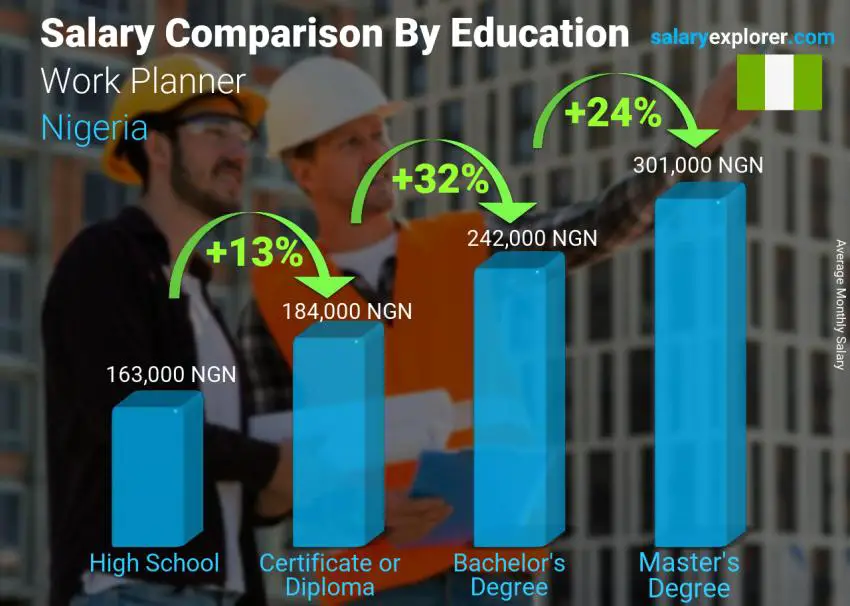
We all know that higher education equals a bigger salary, but how much more money can a degree add to your income? We broke down salaries by education level for the position Work Planner in order to make a comparison.
Level 1: High School
Employees at this education level have an average salary of 163,000 NGN.
Level 2: Certificate or Diploma
At this level, the average salary becomes 184,000 NGN, 13% more than the previous level.
Level 3: Bachelor's Degree
At this level, the average salary becomes 242,000 NGN, 32% more than the previous level.
Level 4: Master's Degree
At this level, the average salary becomes 301,000 NGN, 24% more than the previous level.
Is a Master's degree or an MBA worth it? Should you pursue higher education?
A Master's degree program or any post-graduate program in Nigeria costs anywhere from 1,700,000 NGN to 5,100,000 NGN and lasts approximately two years. That is quite an investment.
You can't really expect any salary increases during the study period, assuming you already have a job. In most cases, a salary review is conducted once education is completed and the degree has been attained.
Many people pursue higher education as a tactic to switch to a higher-paying job. The numbers seem to support the theory. The average increase in compensation while changing jobs is approximately 10% more than the customary salary increment.
If you can afford the costs of higher education, the return on investment is definitely worth it. You should be able to recover the costs in roughly a year or so.
Typical Salary Difference by Education for Most Careers

Salary and Compensation Comparison By Gender / Work Planner / Nigeria

Though gender should not have an effect on pay, in reality, it does. So who gets paid more: men or women? For the people who work as Work Planner in Nigeria, the average difference between the salary of male and female employees is 10%.
| Male | 222,000 NGN | |
| Female | -9% | 202,000 NGN |
Salary Comparison By Gender in Nigeria for all Careers
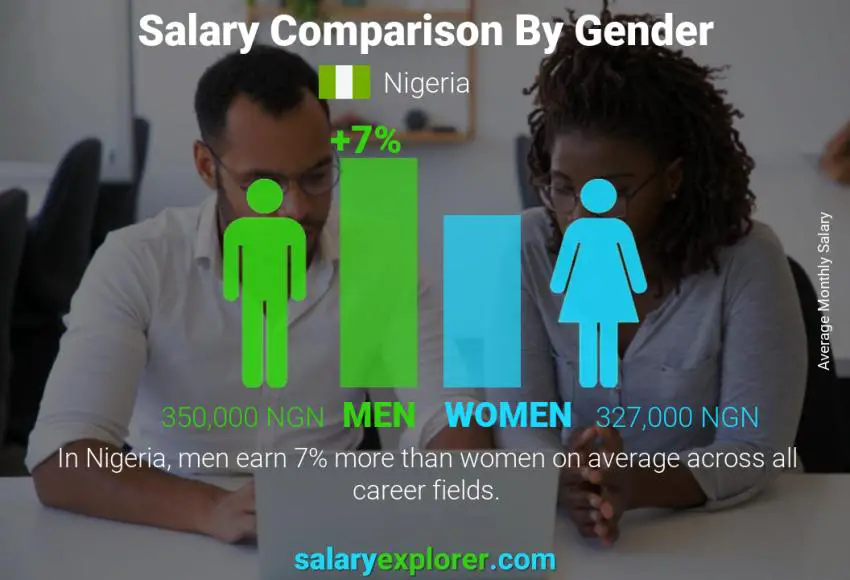
Average Annual Salary Increment Percentage / Work Planner / Nigeria
How much are annual salary increments in Nigeria for individuals working as Work Planner? How often do employees get salary raises?
Individuals working as Work Planner in Nigeria are likely to observe a salary increase of approximately 10% every 19 months. The national average annual increment for all professions combined is 8% granted to employees every 19 months.

Nigeria / All Professions
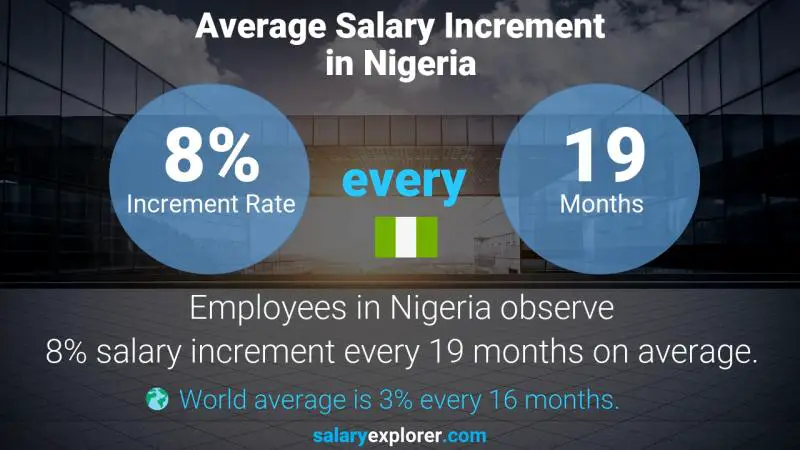
The term Annual Salary Increase usually refers to the increase in 12 calendar month period, but because it is rare that people get their salaries reviewed exactly on the one-year mark, it is more meaningful to know the frequency and the rate at the time of the increase.
How to calculate the salary increment percentage?
The annual salary Increase in a calendar year (12 months) can be easily calculated as follows: Annual Salary Increase = Increase Rate x 12 / Increase Frequency
Worldwide Salary Raises: All Countries and All Jobs
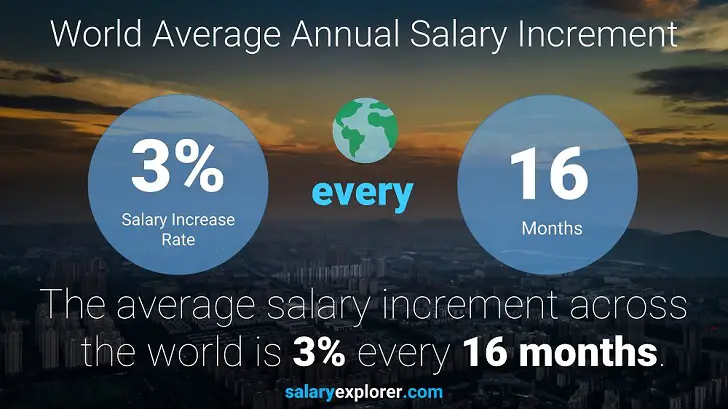
Salary Packages and Schemes
Not all compensation increases are reflected directly in the salary. Some companies offer upgraded packages to their staff instead of cash money. The figures displayed here account only for direct increments to the base salary.
Bonus and Incentive Rates / Work Planner / Nigeria
How much and how often are bonuses being awarded?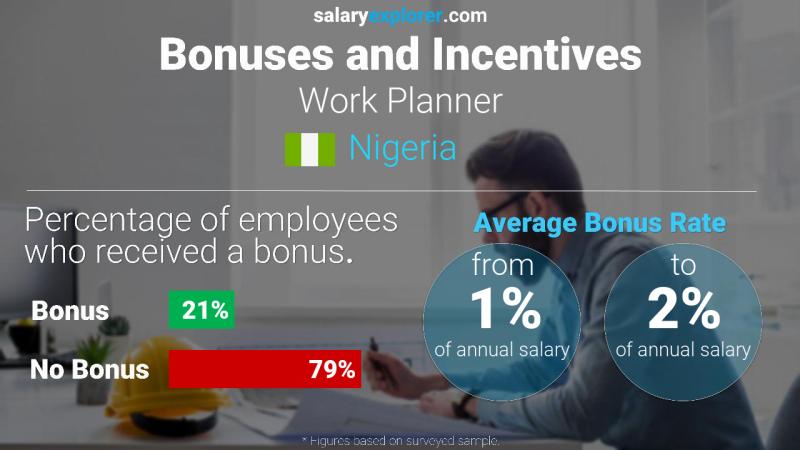 Share This Chart Tweet Get Chart Linkhttp://www.salaryexplorer.com/charts/nigeria/engineering/work-planner/annual-salary-bonus-rate-nigeria-work-planner.jpg
Share This Chart Tweet Get Chart Linkhttp://www.salaryexplorer.com/charts/nigeria/engineering/work-planner/annual-salary-bonus-rate-nigeria-work-planner.jpg
79% of surveyed staff reported that they haven't received any bonuses or incentives in the previous year while 21% said that they received at least one form of monetary bonus.
Those who got bonuses reported rates ranging from 1% to 2% of their annual salary.
| Received Bonus | 21% | |
| No Bonus | 79% |
Types of Bonuses Considered
Individual Performance-Based BonusesThe most standard form of bonus, where the employee is awarded based on their exceptional performance.
Company Performance BonusesOccasionally, some companies like to celebrate excess earnings and profits with their staff collectively in the form of bonuses that are granted to everyone. The amount of the bonus will probably be different from person to person depending on their role within the organization.
Goal-Based BonusesGranted upon achieving an important goal or milestone.
Holiday / End of Year BonusesThese types of bonuses are given without a reason and usually resemble an appreciation token.
Bonuses Are Not Commissions!
People tend to confuse bonuses with commissions. A commission is a prefixed rate at which someone gets paid for items sold or deals completed while a bonus is in most cases arbitrary and unplanned.
What makes a position worthy of good bonuses and a high salary?
The main two types of jobs | |
| Revenue Generators | Supporting Cast |
Employees that are directly involved in generating revenue or profit for the organization. Their field of expertise usually matches the type of business. | Employees that support and facilitate the work of revenue generators. Their expertise is usually different from that of the core business operations. |
Example: | Example: |
Revenue generators usually get more and higher bonuses, higher salaries, and more frequent salary increments. The reason is quite simple: it is easier to quantify your value to the company in monetary terms when you participate in revenue generation.
Bonus Comparison by Seniority Level
Top management personnel and senior employees naturally exhibit higher bonus rates and frequencies than juniors. This is very predictable due to the inherent responsibilities of being higher in the hierarchy. People in top positions can easily get double or triple bonus rates than employees down the pyramid.
Average Hourly Wage / Work Planner / Nigeria
 1,240 NGN per hour
1,240 NGN per hourThe average hourly wage (pay per hour) for individuals working as Work Planner in Nigeria is 1,240 NGN.This is the rate they get paid for every worked hour.
About The Hourly Pay Rate
The hourly wage is the salary paid in one worked hour. Usually, jobs are classified into two categories: salaried jobs and hourly jobs. Salaried jobs pay a fixed amount regardless of the hours worked. Hourly jobs pay per worked hour. To convert salary into hourly wage the above formula is used (assuming 5 working days in a week and 8 working hours per day which is the standard for most jobs). The hourly wage calculation may differ slightly depending on the worked hours per week and the annual vacation allowance. The figures mentioned above are good approximations and are considered to be the standard. One major difference between salaried employees and hourly paid employees is overtime eligibility. Salaried employees are usually exempt from overtime as opposed to hourly paid staff.
What is the minimum hourly rate of pay?
The minimum pay rate per hour for people working as Work Planner in Nigeria is 670 NGN. This is the minimum as per the gathered data in the salary survey not the minimum hourly rate mandated by law.
Salary comparison with similar jobs
| Job Title | Average Salary |
| Engineering |  -100% -100% | |
| 3D Printing Engineer | 266,000 NGN |  +24% +24% |
| Acoustics Engineer | 275,000 NGN |  +28% +28% |
| Assembly Engineering Technician | 233,000 NGN |  +9% +9% |
| Assistant Chief Engineer | 324,000 NGN |  +51% +51% |
| Associate Engineer | 267,000 NGN |  +25% +25% |
| AutoCAD Drafter | 176,000 NGN |  -18% -18% |
| Autocad Operator | 189,000 NGN |  -12% -12% |
| Automation Engineer | 318,000 NGN |  +49% +49% |
| Avionic System Support Engineer | 274,000 NGN |  +28% +28% |
| Biochemical Engineer | 288,000 NGN |  +34% +34% |
| BMS Engineer | 278,000 NGN |  +30% +30% |
| Bridge and Lock Tender | 165,000 NGN |  -23% -23% |
| Broadcast Engineer | 291,000 NGN |  +36% +36% |
| CAD Design Engineer | 314,000 NGN |  +47% +47% |
| CAD Designer | 183,000 NGN |  -15% -15% |
| CAE Engineer | 296,000 NGN |  +38% +38% |
| Ceramics Engineer | 281,000 NGN |  +31% +31% |
| Chemical Engineer | 292,000 NGN |  +36% +36% |
| Civil Drafter | 179,000 NGN |  -16% -16% |
| Civil Engineer | 304,000 NGN |  +42% +42% |
| Civil Site Engineer | 300,000 NGN |  +40% +40% |
| Civil Technician | 188,000 NGN |  -12% -12% |
| Cognitive Engineer | 284,000 NGN |  +33% +33% |
| Commissioning Engineer | 300,000 NGN |  +40% +40% |
| Communications Engineer | 307,000 NGN |  +43% +43% |
| Condition Monitoring Engineer | 250,000 NGN |  +17% +17% |
| Contract Associate Engineer | 293,000 NGN |  +37% +37% |
| Contract Engineer | 282,000 NGN |  +32% +32% |
| Control Systems Engineer | 286,000 NGN |  +34% +34% |
| Controls Engineer | 296,000 NGN |  +38% +38% |
| Controls Software Engineer | 271,000 NGN |  +27% +27% |
| Corrosion Engineer | 276,000 NGN |  +29% +29% |
| Design Engineer | 289,000 NGN |  +35% +35% |
| Director of Engineering | 586,000 NGN |  +170% +170% |
| Drafter | 187,000 NGN |  -13% -13% |
| Drafting Manager | 329,000 NGN |  +54% +54% |
| Drilling Engineer | 292,000 NGN |  +36% +36% |
| Drilling Foreman | 93,800 NGN |  -56% -56% |
| Electrical Draughtsman | 146,000 NGN |  -32% -32% |
| Electrical Engineer | 316,000 NGN |  +48% +48% |
| Electrical Engineering Manager | 438,000 NGN |  +100% +100% |
| Electromechanical Engineering Technologist | 327,000 NGN |  +53% +53% |
| Electromechanical Equipment Assembler | 153,000 NGN |  -29% -29% |
| Energy Engineer | 309,000 NGN |  +44% +44% |
| Engine Assembler | 138,000 NGN |  -36% -36% |
| Engineer | 309,000 NGN |  +44% +44% |
| Engineering Account Manager | 326,000 NGN |  +52% +52% |
| Engineering Chief Designer | 322,000 NGN |  +50% +50% |
| Engineering Consultant | 383,000 NGN |  +79% +79% |
| Engineering Key Account Manager | 415,000 NGN |  +94% +94% |
| Engineering Lab Technician | 270,000 NGN |  +26% +26% |
| Engineering Manager | 422,000 NGN |  +97% +97% |
| Engineering Planning Manager | 402,000 NGN |  +88% +88% |
| Engineering Production Manager | 533,000 NGN |  +150% +150% |
| Engineering Project Analyst | 359,000 NGN |  +68% +68% |
| Engineering Project Coordinator | 333,000 NGN |  +56% +56% |
| Engineering Project Director | 575,000 NGN |  +170% +170% |
| Engineering Project Leader | 362,000 NGN |  +69% +69% |
| Engineering Project Manager | 413,000 NGN |  +93% +93% |
| Engineering Research and Development Manager | 495,000 NGN |  +130% +130% |
| Engineering Safety Coordinator | 238,000 NGN |  +11% +11% |
| Engineering Sales Manager | 405,000 NGN |  +89% +89% |
| Engineering Technician | 229,000 NGN |  +7% +7% |
| Engineering Technologist | 241,000 NGN |  +13% +13% |
| Environmental Engineer | 303,000 NGN |  +41% +41% |
| Equipment Engineer | 271,000 NGN |  +27% +27% |
| Equipment Engineering Manager | 375,000 NGN |  +75% +75% |
| Estimator | 247,000 NGN |  +15% +15% |
| Fabrication Specialist | 209,000 NGN |  -2% -2% |
| Fabricator | 129,000 NGN |  -40% -40% |
| Facade Engineer | 290,000 NGN |  +35% +35% |
| Fiber Analyst | 169,000 NGN |  -21% -21% |
| Field Engineer | 314,000 NGN |  +47% +47% |
| Field Engineering Manager | 489,000 NGN |  +130% +130% |
| Fire Engineer | 303,000 NGN |  +41% +41% |
| Fitter and Turner | 92,900 NGN |  -57% -57% |
| Forestry Strategic Planner | 353,000 NGN |  +65% +65% |
| Generation Engineer | 305,000 NGN |  +42% +42% |
| Genetic Engineer | 321,000 NGN |  +50% +50% |
| Geological Engineer | 317,000 NGN |  +48% +48% |
| Geotechnical Engineer | 326,000 NGN |  +52% +52% |
| Heavy Equipment Mechanic | 150,000 NGN |  -30% -30% |
| Highway Engineer | 293,000 NGN |  +37% +37% |
| HSE Professional | 287,000 NGN |  +34% +34% |
| Human Machine Interface Engineer | 280,000 NGN |  +31% +31% |
| HVAC Engineer | 300,000 NGN |  +40% +40% |
| HVAC Supervisor | 276,000 NGN |  +29% +29% |
| Industrial Engineer | 288,000 NGN |  +34% +34% |
| Industrial Engineering Technologist | 279,000 NGN |  +30% +30% |
| Instrument Engineer | 278,000 NGN |  +30% +30% |
| Instrument Technician | 169,000 NGN |  -21% -21% |
| Instrumentation and Control Engineer | 293,000 NGN |  +37% +37% |
| Instrumentation Designer | 240,000 NGN |  +12% +12% |
| Instrumentation Engineer | 298,000 NGN |  +39% +39% |
| Instrumentation Manager | 297,000 NGN |  +39% +39% |
| Irrigation Engineer | 278,000 NGN |  +30% +30% |
| Licensed Aircraft Engineer | 326,000 NGN |  +52% +52% |
| Locomotive Engineer | 274,000 NGN |  +28% +28% |
| Maintenance Engineer | 285,000 NGN |  +33% +33% |
| Maintenance Fitter | 102,000 NGN |  -52% -52% |
| Maintenance Manager | 306,000 NGN |  +43% +43% |
| Manufacturing Engineer | 280,000 NGN |  +31% +31% |
| Marine Engineer | 310,000 NGN |  +45% +45% |
| Materials Engineer | 290,000 NGN |  +35% +35% |
| Materials Researcher | 288,000 NGN |  +34% +34% |
| Materials Technician | 219,000 NGN |  +2% +2% |
| Mechanical and Electrical Engineer | 326,000 NGN |  +52% +52% |
| Mechanical Design Engineer | 309,000 NGN |  +44% +44% |
| Mechanical Designer | 265,000 NGN |  +24% +24% |
| Mechanical Engineer | 302,000 NGN |  +41% +41% |
| Mechanical Engineering Manager | 422,000 NGN |  +97% +97% |
| Mechanical Inspector | 286,000 NGN |  +34% +34% |
| Mechatronics Engineer | 303,000 NGN |  +41% +41% |
| Mining Engineer | 295,000 NGN |  +38% +38% |
| Nanotechnology Engineer | 313,000 NGN |  +46% +46% |
| Natural Language Processing Engineer | 330,000 NGN |  +54% +54% |
| Oil and Petrochemical Engineer | 333,000 NGN |  +56% +56% |
| Optical Engineer | 286,000 NGN |  +34% +34% |
| Optical Instrument Assembler | 143,000 NGN |  -33% -33% |
| PCB Assembler | 112,000 NGN |  -48% -48% |
| Photonics Engineer | 324,000 NGN |  +51% +51% |
| Photonics Technician | 253,000 NGN |  +18% +18% |
| Pipeline Engineer | 261,000 NGN |  +22% +22% |
| Piping Designer | 164,000 NGN |  -23% -23% |
| Piping Engineer | 266,000 NGN |  +24% +24% |
| Planning Engineer | 286,000 NGN |  +34% +34% |
| Pressure Vessel Inspector | 143,000 NGN |  -33% -33% |
| Principal Cost Engineer | 311,000 NGN |  +45% +45% |
| Principal Engineer | 285,000 NGN |  +33% +33% |
| Principal Support Engineer | 302,000 NGN |  +41% +41% |
| Process Engineer | 290,000 NGN |  +35% +35% |
| Process Operator | 177,000 NGN |  -17% -17% |
| Product Development Engineer | 322,000 NGN |  +50% +50% |
| Product Development Technician | 223,000 NGN |  +4% +4% |
| Product Engineer | 309,000 NGN |  +44% +44% |
| Product Safety Engineer | 277,000 NGN |  +29% +29% |
| Production Engineer | 281,000 NGN |  +31% +31% |
| Project Engineer | 301,000 NGN |  +41% +41% |
| Proposal Manager | 381,000 NGN |  +78% +78% |
| Purchasing Engineer | 264,000 NGN |  +23% +23% |
| Quality Assurance Engineer | 299,000 NGN |  +40% +40% |
| Rail Engineer | 292,000 NGN |  +36% +36% |
| Regional Field Engineer | 331,000 NGN |  +55% +55% |
| Remote Sensing Engineer | 282,000 NGN |  +32% +32% |
| Robotics Engineer | 320,000 NGN |  +49% +49% |
| Robotics Technician | 246,000 NGN |  +15% +15% |
| Safety Engineer | 306,000 NGN |  +43% +43% |
| Safety Inspector | 240,000 NGN |  +12% +12% |
| Safety Manager | 353,000 NGN |  +65% +65% |
| Safety Officer | 147,000 NGN |  -31% -31% |
| Sales Engineer | 310,000 NGN |  +45% +45% |
| Scheduling Engineer | 275,000 NGN |  +28% +28% |
| Security Engineer | 326,000 NGN |  +52% +52% |
| Service Engineer | 321,000 NGN |  +50% +50% |
| Smart Home Engineer | 318,000 NGN |  +49% +49% |
| Solar Engineer | 304,000 NGN |  +42% +42% |
| Staff Engineer | 298,000 NGN |  +39% +39% |
| Static Equipment Engineer | 292,000 NGN |  +36% +36% |
| Stationary Engineer | 258,000 NGN |  +20% +20% |
| Stress Engineer | 284,000 NGN |  +33% +33% |
| Structural Analysis Engineer | 287,000 NGN |  +34% +34% |
| Structural Designer | 255,000 NGN |  +19% +19% |
| Structural Engineer | 304,000 NGN |  +42% +42% |
| Structural Technician | 191,000 NGN |  -11% -11% |
| Subsea Engineer | 377,000 NGN |  +76% +76% |
| Supply Chain Specialist | 299,000 NGN |  +40% +40% |
| Surveyor | 218,000 NGN |  +2% +2% |
| Technical Affairs Officer | 154,000 NGN |  -28% -28% |
| Technical Assistant | 150,000 NGN |  -30% -30% |
| Technical Engineer | 256,000 NGN |  +20% +20% |
| Technical Support Engineer | 250,000 NGN |  +17% +17% |
| Tender Engineer | 263,000 NGN |  +23% +23% |
| Test Development Engineer | 282,000 NGN |  +32% +32% |
| Test Engineer | 298,000 NGN |  +39% +39% |
| Transportation Engineer | 279,000 NGN |  +30% +30% |
| Urban Engineer | 295,000 NGN |  +38% +38% |
| Validation Engineer | 255,000 NGN |  +19% +19% |
| Verification Engineer | 274,000 NGN |  +28% +28% |
| Wastewater Engineer | 285,000 NGN |  +33% +33% |
| Wind Energy Engineer | 297,000 NGN |  +39% +39% |
| Wind Energy Operations Manager | 411,000 NGN |  +92% +92% |
| Wireless Engineer | 308,000 NGN |  +44% +44% |
| Work Planner | 214,000 NGN |  -0% -0% |
Government vs Private Sector Salary Comparison
Where can you get paid more, working in a private company or the government? The difference between the public or government sector salaries and the private sector salaries in Nigeria is 6% on average across all career fields.
| Private Sector | 329,000 NGN | |
| Public Sector | +6% | 349,000 NGN |
Salary Statistics and Calculation Guide
What is considered to be a good and competitive salary for the job title Work Planner in Nigeria?
A good and competitive compensation would range anywhere between 191,000 NGN and 216,000 NGN. This is a very rough estimate. Experience and education play a very huge part in the final earnings.
Gross Salary (before tax) and Net Salary (after tax)
All salary and compensation figures displayed here are gross salary figures, that is the salary before tax deductions. Because taxes may differ across sectors and locations, it is difficult to accurately calculate the net salary after tax for every career.
Base / Basic Salary
The base salary for a careers like Work Planner in Nigeria ranges from 116,000 NGN to 160,000 NGN. The base salary depends on many factors including experience and education. It is not easy to provide a figure with very little information, so take this range with a grain of salt.
What is the difference between the median and the average salary?
Both are indicators. If your salary is higher than both the average and the median then you are doing very well. If your salary is lower than both, then many people earn more than you and there is plenty of room for improvement. If your wage is between the average and the median, then things can be a bit complicated. We wrote a guide to explain all about the different scenarios. How to compare your salary




